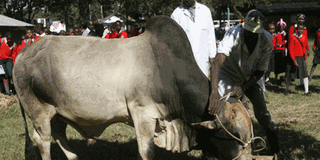Meet Baba Yao, the proud father of 30

A bull nicknamed Baba Yao at ADC Mutara Ranch stand at a Nakuru ASK Show. Many farmers are expected at the inaugural South Rift agribusiness fair set to kick of on Friday. FILE PHOTO |
What you need to know:
- Baba Yao’s size and sturdiness contributed highly to his win at the ongoing ASK exhibition, but this did not come easily. His feeding habits and healthy lifestyle played a greater part.
- Though the Boran is a rare breed, it is highly marketable. Among its merits is its high quality meat, which has good bone content and low fat compared to other breeds.
- The ranch attracts buyers from as far as Tanzania, Uganda, Mauritius and Zambia, who buy and export them.
Seeing him for the first time, one would be forgiven for thinking the giant bull is aggressive and unfriendly.
But ‘Baba Yao’, bull number 1,577 at Agriculture Development Corporation (ADC) Mutara Ranch in Laikipia County, is calm and amiable.
The Boran animal, sire number 1,232, was crowned Champion Bull at the ongoing Nakuru ASK Show yesterday. He also scooped the top position among Zebu bulls.
At the age of seven, ‘Baba Yao’, as he is fondly known, is a proud father of 30 calves, and he is still counting. By the time he retires in about two years, he would have hit up to 100 calves, according to his handlers.
He weighs 720kg and has a price tag of Sh150,000. However, he is not on sale because ADC Mutara Ranch depends highly on him for quality calves.
“His genes are of high quality. We need him because his father is too old to sire,” said Abdilatiff Adan, the farm manager, adding that his semen is sold at Sh2,000.
Baba Yao’s size and sturdiness contributed highly to his win at the ongoing ASK exhibition, but this did not come easily. His feeding habits and healthy lifestyle played a greater part.
“He was exclusively breastfed for up to eight months,” Adan said.
All calves at the farm breastfeed for the same period to give them strength and boost immunity.
Baba Yao is a free range bull at the 63,000-acre farm where he feeds on grass, among other fodder.
Adan said that like other cattle on the ranch, he is not fed on any supplements but only licks salt and drinks water to supplement what he feeds around the ranch.
Highly marketable
Though the Boran is a rare breed, it is highly marketable. Among its merits is its high quality meat, which has good bone content and low fat compared to other breeds.
“Borans have a 1:1 meat to fat ratio. They have less fat compared to other breeds like Hereford.”
The ranch attracts buyers from as far as Tanzania, Uganda, Mauritius and Zambia, who buy and export them.
At times, semen is exported to as far as South Africa for breeding.
However, farmers are not allowed to bring in their cows for breeding in the ranch due to risks involved, such as diseases. Instead, they are advised to buy bulls and cross-breed with their heifers to improve their breeds.
A two-year old Boran bull goes for Sh90,000 while a pregnant heifer goes for Sh80,000.
At the age of two, Boran bulls are mature to sire. The ranch sells an average of 40 to 50 bulls both locally and internationally annually. It currently has a stock of 4,500 cattle with 200 of them being bulls, said Adan.





